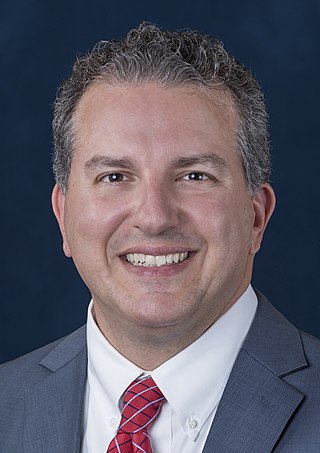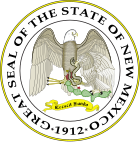
The North Carolina Council of State is the collective body of ten elective executive offices in the state government of North Carolina, all of which are established by the state constitution. The Council of State includes the Governor, Lieutenant Governor, Secretary of State, State Auditor, Treasurer, Superintendent of Public Instruction, Attorney General, Commissioner of Agriculture, Commissioner of Labor, and Commissioner of Insurance. Together with the North Carolina Cabinet and several independent agencies, the Council of State offices constitute the executive branch of North Carolina's state government.

The State Corporation Commission, or SCC, is a Virginia (USA) regulatory agency whose authority encompasses utilities, insurance, state-chartered financial institutions, securities, retail franchising, and railroads. It is the state's central filing office for corporations, limited partnerships, limited liability companies and Uniform Commercial Code liens.
A law enforcement officer (LEO), or peace officer in North American English, is a public-sector or private-sector employee whose duties primarily involve the enforcement of laws, protecting life & property, keeping the peace, and other public safety related duties. Law enforcement officers are designated certain powers & authority by law to allow them to carry out their responsibilities.

The government of Florida is established and operated according to the Constitution of Florida and is composed of three branches of government: the executive branch consisting of the governor of Florida and the other elected and appointed constitutional officers; the legislative branch, the Florida Legislature, consisting of the Senate and House; and the judicial branch consisting of the Supreme Court of Florida and lower courts. The state also allows direct participation of the electorate by initiative, referendum, and ratification.

The Florida Cabinet is a body of the government of Florida comprising the attorney general, the commissioner of agriculture, and the chief financial officer that engages in the collective governance of the state.

The chief financial officer of Florida is an elected statewide constitutional officer of Florida. The office was created in 2002 following the 1998 reforms of the Florida Cabinet. The CFO is a combination of the former offices of comptroller and treasurer/insurance commissioner/fire marshal. The office heads the Florida Department of Financial Services and is responsible for overseeing the state's finances, collecting revenue, paying state bills, auditing state agencies, regulating cemeteries and funerals, and handling fires and arsons. In addition, the CFO has administrative oversight over the offices which handles banking and insurance regulation. The CFO is a member of the Cabinet is third in the line of succession to the office of Governor of Florida.
The Minnesota Public Utilities Commission (MPUC) is an independent regulatory agency within the U.S. state of Minnesota responsible for the oversight and regulation of public utilities, including electric, natural gas, and telecommunications services. Created by the Minnesota Legislature, the commission's primary mission is to ensure that residents of Minnesota have access to safe, adequate, and efficient utility services at fair, reasonable rates. It plays a significant role in balancing the needs of consumers, the environment, and utility companies.

The Texas Department of Insurance (TDI) regulates insurers and other companies that conduct insurance business in Texas, and assists Texas-based insurance consumers. TDI was founded in 1876 as the Department of Insurance, Statistics and History.

The California Public Utilities Commission is a regulatory agency that regulates privately owned public utilities in the state of California, including electric power, telecommunications, natural gas and water companies. In addition, the CPUC regulates common carriers, including household goods movers, limousines, rideshare services, self-driving cars, and rail crossing safety. The CPUC has headquarters in the Civic Center district of San Francisco, and field offices in Los Angeles and Sacramento.

The Secretary of State of Wisconsin is a constitutional officer in the executive branch of the government of the U.S. state of Wisconsin, and is second in the line of succession to the office of Governor of Wisconsin. Twenty-nine individuals have held the office of Secretary of State, two of whom have held non-consecutive terms. The incumbent is Sarah Godlewski, who was appointed by Governor Tony Evers on March 17, 2023 to replace long-time Secretary of State Doug La Follette.

The government of the U.S. State of Oklahoma, established by the Oklahoma Constitution, is a republican democracy modeled after the federal government of the United States. The state government has three branches: the executive, legislative, and judicial. Through a system of separation of powers or "checks and balances," each of these branches has some authority to act on its own, some authority to regulate the other two branches, and has some of its own authority, in turn, regulated by the other branches.

The Oklahoma Corporation Commission is the public utilities commission of the U.S state of Oklahoma run by three statewide elected commissioners. Authorized to employ more than 400 employees, it regulates oil and gas drilling, utilities and telephone companies.
The Office of the Superintendent of Financial Institutions is an independent agency of the Government of Canada reporting to the Minister of Finance created "to contribute to public confidence in the Canadian financial system". It is the sole regulator of banks, and the primary regulator of insurance companies, trust companies, loan companies and pension plans in Canada.

The commissioner of insurance is a statewide elected office in the U.S. state of North Carolina. The commissioner is a constitutional officer who leads the state's Department of Insurance. The commissioner also oversees the Office of the State Fire Marshal and sits on the North Carolina Council of State. The current commissioner is Mike Causey, who has held that office since January 1, 2017.

The government of Arizona is the governmental structure of the state of Arizona as established by the Arizona Constitution. The executive is composed of the Governor, several other statewide elected officials, and the Governor's cabinet. The Arizona Legislature consists of the House of Representatives and Senate. The judiciary is composed of the Arizona Supreme Court and lower courts. There is also local government, consisting of counties, municipalities and special districts.

The government of Indiana is established and regulated by the Constitution of Indiana. The state-level government consists of three branches: the judicial branch, the legislative branch, and the executive branch. The three branches share power and jointly govern the state of Indiana. County and local governments are also constitutional bodies with limited authority to levy taxes, pass legislation, and create and maintain local public infrastructure.
The Georgia Public Service Commission (PSC) is a statutory organ of the state government of Georgia; elected among five commission districts, the board consists of a Chairman, a Vice-chairman, and three Commissioners. PSC regulates telecommunications, transportation, electric and natural gas services in the U.S. state of Georgia. Commissioners are elected in partisan elections statewide, though they must reside in a district.

The 2010 Oklahoma elections were held on November 2, 2010. The primary election was held on July 27. The runoff primary election was held August 24.
The New Jersey Department of Banking and Insurance (DOBI) is one of 15 principal departments in New Jersey government. The department's mission is to regulate the banking, insurance and real estate industries in a professional and timely manner that protects and educates consumers and promotes the growth, financial stability and efficiency of these industries. The Commissioner of DOBI is Marlene Caride.

Florida Amendment 8 is an amendment to the Florida state constitution that was passed on November 3, 1998. This amendment, which had first been put forth by the Florida Constitutional Revision Commission, amended articles 2, 3, 4, 8, 9, 11, and 13 of Florida's state constitution in an attempt to restructure the cabinet.












